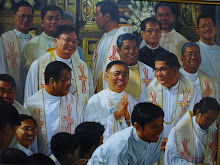Tuesday, July 7, 2009
ACCEPTING OR REJECTING PROPHETS
14th Sunday in Ordinary Time (B)
July 12, 2009
The readings of today revolve around the basic idea of mission. Amos, although, by his own admission, not originally belonging to “a company of prophets,” but a “shepherd and a dresser of sycamores,” was chosen by God, taken “from following the flock,” and told to “go, and prophesy to [the] people [of] Israel.” St. Paul, for his part, thanks and glorifies God, “who has blessed us in Christ with every spiritual blessing in the heavens, as he chose us in him, before the foundation of the world.” In the Gospel, we hear Jesus sending out his disciples two by two who “went off and preached repentance.”
“In him we were also chosen,” St. Paul goes on to say. We are called. We are sent. Like the original twelve around Jesus. We are chosen and called to proclaim and prophesy in God’s behalf. The choosing, the calling and the sending, however, were not without challenges, difficulties and problems!
Amos, for one, drew the ire of the priest Amaziah. The envious and insecure Amaziah told Amos to go right back to where he came from – Judah -- and limit his prophesying there. Not satisfied with that form of spiteful verbal abuse, Amaziah even made use of his connections and denounced him before King Jeroboam II, warning the king that Amos had conspired against him. (cf. Amos 7:10-11) The twelve, sent two by two, were told by Jesus to go and preach, taking with them only the barest minimum, and forewarned them of the possibility of being rejected by the very people they would be ministering to.
Modern-day prophets who are no less chosen, called and sent by God fare no better than those referred to in today’s readings. Let us look at a few concrete examples … The Holy Father’s perceived “hard” teachings on matters of morals and discipline meet with not just a little opposition from many quarters in and out of the Church. The Mass Media, by and large, show a lot of subtle and not-so-subtle opposition, by watering down the teachings, at times reducing them to absurdity, by resorting to subtle innuendoes and to half-truths, giving unwary readers a lopsided – if, biased – version of the teachings. Legislators and people in the executive branches of government, ever cautious and conscious of the rise or fall of their popularity, simply ignore what is described by popular mass media as “outdated, conservative and hopelessly anachronistic, mediavalist” teachings from a Church further described as meddlesome and as against freedom, progress and development. Like Amos, modern-day prophets sent by God are told to preach elsewhere, but should have nothing to do with whatever people do in the privacy of their bedrooms and homes! Pastors, who happen not to fit the frames of “ideal pastors” in the minds of moneyed and powerful blocks in and out of the parish pastoral councils, are either “silenced” or “co-opted” by people in high places into executing their own plans and expectations. How many pastors have been unceremoniously removed from office on account of some of these so-called petitions from “power-brokers” from within our communities? How often have our pastors, including bishops, been crucified on account of their standing steadfast with the official teachings of the Church as articulated by the Holy Father? Today is a good opportunity for us to reflect on acceptance of the God-sent prophets in our midst. The choosing, the calling, and the sending – as we have seen – belong to God and God alone. Our response of acceptance? “I will hear what God proclaims” … Our prayer? “Lord, let us see your kindness and grant us your salvation!”
July 12, 2009
The readings of today revolve around the basic idea of mission. Amos, although, by his own admission, not originally belonging to “a company of prophets,” but a “shepherd and a dresser of sycamores,” was chosen by God, taken “from following the flock,” and told to “go, and prophesy to [the] people [of] Israel.” St. Paul, for his part, thanks and glorifies God, “who has blessed us in Christ with every spiritual blessing in the heavens, as he chose us in him, before the foundation of the world.” In the Gospel, we hear Jesus sending out his disciples two by two who “went off and preached repentance.”
“In him we were also chosen,” St. Paul goes on to say. We are called. We are sent. Like the original twelve around Jesus. We are chosen and called to proclaim and prophesy in God’s behalf. The choosing, the calling and the sending, however, were not without challenges, difficulties and problems!
Amos, for one, drew the ire of the priest Amaziah. The envious and insecure Amaziah told Amos to go right back to where he came from – Judah -- and limit his prophesying there. Not satisfied with that form of spiteful verbal abuse, Amaziah even made use of his connections and denounced him before King Jeroboam II, warning the king that Amos had conspired against him. (cf. Amos 7:10-11) The twelve, sent two by two, were told by Jesus to go and preach, taking with them only the barest minimum, and forewarned them of the possibility of being rejected by the very people they would be ministering to.
Modern-day prophets who are no less chosen, called and sent by God fare no better than those referred to in today’s readings. Let us look at a few concrete examples … The Holy Father’s perceived “hard” teachings on matters of morals and discipline meet with not just a little opposition from many quarters in and out of the Church. The Mass Media, by and large, show a lot of subtle and not-so-subtle opposition, by watering down the teachings, at times reducing them to absurdity, by resorting to subtle innuendoes and to half-truths, giving unwary readers a lopsided – if, biased – version of the teachings. Legislators and people in the executive branches of government, ever cautious and conscious of the rise or fall of their popularity, simply ignore what is described by popular mass media as “outdated, conservative and hopelessly anachronistic, mediavalist” teachings from a Church further described as meddlesome and as against freedom, progress and development. Like Amos, modern-day prophets sent by God are told to preach elsewhere, but should have nothing to do with whatever people do in the privacy of their bedrooms and homes! Pastors, who happen not to fit the frames of “ideal pastors” in the minds of moneyed and powerful blocks in and out of the parish pastoral councils, are either “silenced” or “co-opted” by people in high places into executing their own plans and expectations. How many pastors have been unceremoniously removed from office on account of some of these so-called petitions from “power-brokers” from within our communities? How often have our pastors, including bishops, been crucified on account of their standing steadfast with the official teachings of the Church as articulated by the Holy Father? Today is a good opportunity for us to reflect on acceptance of the God-sent prophets in our midst. The choosing, the calling, and the sending – as we have seen – belong to God and God alone. Our response of acceptance? “I will hear what God proclaims” … Our prayer? “Lord, let us see your kindness and grant us your salvation!”
Subscribe to:
Post Comments (Atom)


No comments:
Post a Comment